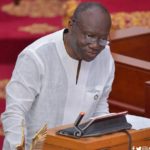Policy analyst, Dr. Steve Manteaw says under no circumstances should the utility companies pass on their inefficiencies to consumers.
Speaking to Francis Abban on GHOne TV State Affairs show, Dr. Manteaw advised the Public Utility Regulatory Commission (PURC) to relook at the national bench marks and reconsider passing the cost of inefficiencies to consumers.
“Don’t pass inefficiencies to the consumers. I heard the PURC talking about the benchmark and indicators that for water the regulatory bench mark is 45% that is onerous. What that means is that you produce water and you allow 45% of what you produce to go to waste. That is too much.
“They must also review the technical and commercial losses because no matter what happens most of those losses are fed into the determination of the tariffs. If you have to go into the regulatory bench mark you will see that the companies’ inefficiencies are in there to be paid for,” he added.
Dr. Manteaw therefore, advised the utility companies to provide numbers that the public can call in to report thefts and other linkages in the system.
Background
The Electricity Company of Ghana (ECG) and Ghana Water Company are demanding over 130% increment in utility tariffs.
In a separate proposal from the companies to Public Utilities Regulatory Commission (PURC), they indicated that the increment will help their respective companies stay afloat.
ECG has based its demand on the Distribution Service Charges (DSC).
The result of ECG’s tariff proposal for the next five years shows an approximately 148% increase on the current DSC1 in 2022 and an average increase of 7.6% year on year from 2023 to 2026.
“The financial sustainability of the Electricity Company of Ghana is important as it impacts on the entire energy sector. With the huge investment needs facing the distribution industry over the next five years, it is expected that the proposed tariff increases would inevitably be approved to sustain efficient and reliable electricity service.
“Over the next five years, the DSC will need to increase consistently (average of 7.6%) to cover distribution costs. It is expected that the approved BGC would correspond with the commercial terms of PPAs (Power Plant Agreements),” portions of the proposal explained.
However, the Ranking Member for Energy Committee in Parliament, John Jinapor has questioned the increment.
“Why are they going back to 2019 and 2020? We cannot adjust prices for those years and go back again,” Mr. Jinapor quizzed on TV3.
He continued: “Moreover, ECG’s losses have increased from 22 per cent to 30 per cent. These inefficiencies cannot be passed onto consumers. The other thing that is leading to this proposed increase is the exchange rate, the fall of the cedi is due to the bad management of the economy. The ordinary Ghanaian must not suffer.”
Source: Ghana/Starrfm.com.gh/103.5FM/Isaac Dzidzoamenu




